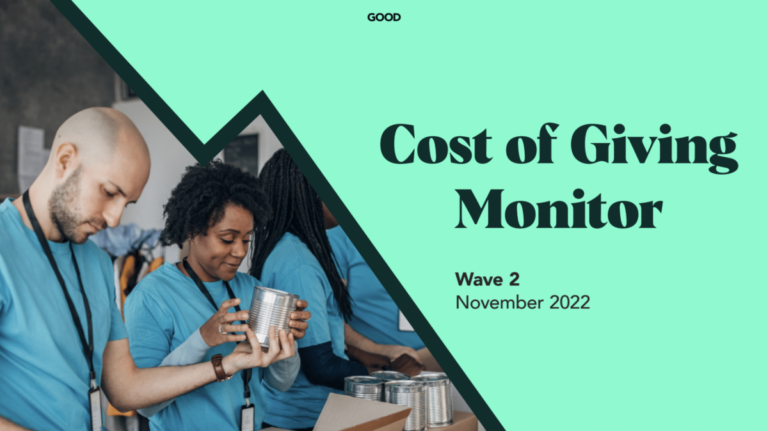Finances worsening but more than half plan to keep giving the same, report finds

More than half (59%) of people in the UK feel their finances are worsening – up from 53% in July. However, giving up charitable giving comes low on the list for many, with 56% planning to keep their level of giving the same according to wave 2 of GOOD’s Cost of Giving Monitor.
The Monitor saw GOOD partner with YouGov to survey 2,002 UK adults, asking respondents about their finances, their charitable giving, and causes they feel need urgent support.
While July’s wave 1 of the Cost of Giving Monitor showed that those feeling the most strain on their finances were Gen X and individuals with children under 18, this has spread out. The biggest increase since July is among Baby Boomers, with 62% reporting a worsening financial situation, up from 52%, while more affluent groups across the board are beginning to feel a similar level of strain as those in low affluence groups.
Advertisement
Of the 2,002 surveyed, 81% agreed that they are paying more attention to their outgoings than they did three months ago, with cutbacks on spending likely in many areas including eating and drinking out, energy for their homes, and Christmas presents.
1 in 5 plan to give less – but more than half to keep it the same
Asked how their charitable giving is likely to change in the next three months, 20% of respondents said they would give less – up from 18% in July, while 11% will give more – up from 6%. 56% plan to keep it the same.
Looking further into donation intentions and comparing October with July, the Monitor shows that the number of millennials likely to give more has risen from 6% to 13%, while more Baby boomers plan to give less (12% to 18%). 33% of Gen Z respondents said they will give the same amount (up from 21% in July).
Splitting respondents into heavy givers (donating more than £50 in the last 3 months) and light givers (donating less than this), GOOD found that heavy givers are more like to intend to keep their donation values the same or at increased levels, while light givers are more likely to cut back. In fact 16% of heavy givers say they will increase their giving compared to 9% of light givers, while 22% of light givers plan to cut back over the next three months, compared to 16% of heavy givers.
When questioned on how their Christmas giving might differ compared to last year, most people felt their donation amounts would stay the same. Heavy givers were more likely to say they will give more this year, while light givers to cut back or to be unsure whether they would give at all, or if so, how much.
Critical causes, & growing support for charities taking a political position
More Brits (75%) believe more people in the UK need support in the cost-of-living crisis than they did in the COVID pandemic compared to the first wave in July (68%). However, the report also finds that the crisis has lost some urgency, with environmental crises gaining traction (+7% whilst UK poverty has decreased by 9% as the causes needing the most urgent support).
Almost half (45%) agree that charities should take a political position to address the cost-of-living crisis and that it is key to making change happen. This is an increase of 14% from 2021, where GOOD’s Giving Britain research report found that the public was more sceptical of charities taking a political position. In terms of longevity, Britons overwhelmingly feel that the crisis is a long-term issue that won’t be resolved quickly (82%).
Chris Norman, CEO of GOOD Agency, said:
“The second wave of the Cost of Giving Monitor not only provides an important insight into how the cost-of-living crisis is influencing people’s behaviour but also how it is shaping their views on the role charities should play in influencing government policy. People understand that this downturn could take some time to get through. Still, their expectations are significantly hardening towards charity’s role in informing policy to mitigate the impact of the crisis, as well as influencing the speed and shape of the recovery. It’s not unusual for the public to become more politically engaged in a downturn, but the level of expectation of charities to step up and use their weight to make life better for those affected is significant.”



